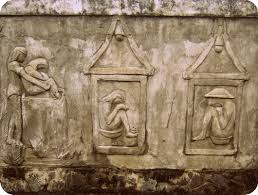Natural Thermal Baths
Tondano city has cool weather, which sometimes piercing
chill to the bone. If you come to the Capital District Minahasa, refreshing in
warm water baths be the right choice. In Tondano, there are some points hot
water bath which is always crowded. It is located in three villages namely
Tataaran I, Tataaran II, and Koya. On the weekends, or red dates, a hot water
bath is always crowded. Visited by many local people, as well as visitors from
outside the area. The swimming baths, the average small. Not by the pool in
general. Just soak can, but even small for swimming are possible. In addition
to the pool, the manager also provides a specially equipped bathroom with
bath-ups if we want to soak in private. The hot water that flowed directly from
this source, has a sulfur content that is believed to cure skin diseases. We
will also feel comfortable and relaxed while soaking in a hot water bath, so
will make our bodies feel more refreshed. In
addition to enjoying the fresh hot
water bathing, we can also enjoy the natural scenery around the baths are
beautiful, cool and natural. Warm water pool in the village of Koya be a
recommendation to visit. This pool, became one of the most favorite places for
a hot water bath. The pool is simple, but comfortable to live. About the
cleanliness, the pool manager was so pay attention. No wonder many visitors.
Koya is a fairly large village, which is located in the west of the City
Tondano.
Minahasa traditional graves (Waruga)
Waruga is a grave or tomb ancestors of the Minahasa people
are made of stone and consists of two parts. The top of the triangle-shaped
like rooftops and the bottom of the box-shaped middle part there is space. The
person who has died is put in a position facing north, and seated with the heel
of the foot attached to the buttocks and knees to kiss the head. Meaning of
faced to the north indicating, that the ancestors of
Minahasa came from the
North. Waruga which had carvings and reliefs generally found in Tonsea.
Carvings and reliefs that illustrate how the bodies were stored in waruga
concerned, emphasizing livelihood or that person's work during his lifetime. In
this waruga will find various types of objects, which include, stoneware clay,
metal objects, swords, spears, beads, bronze bracelets, plates, etc. Which
incidentally included as stock tomb for the deceased person.











0 komentar:
Posting Komentar